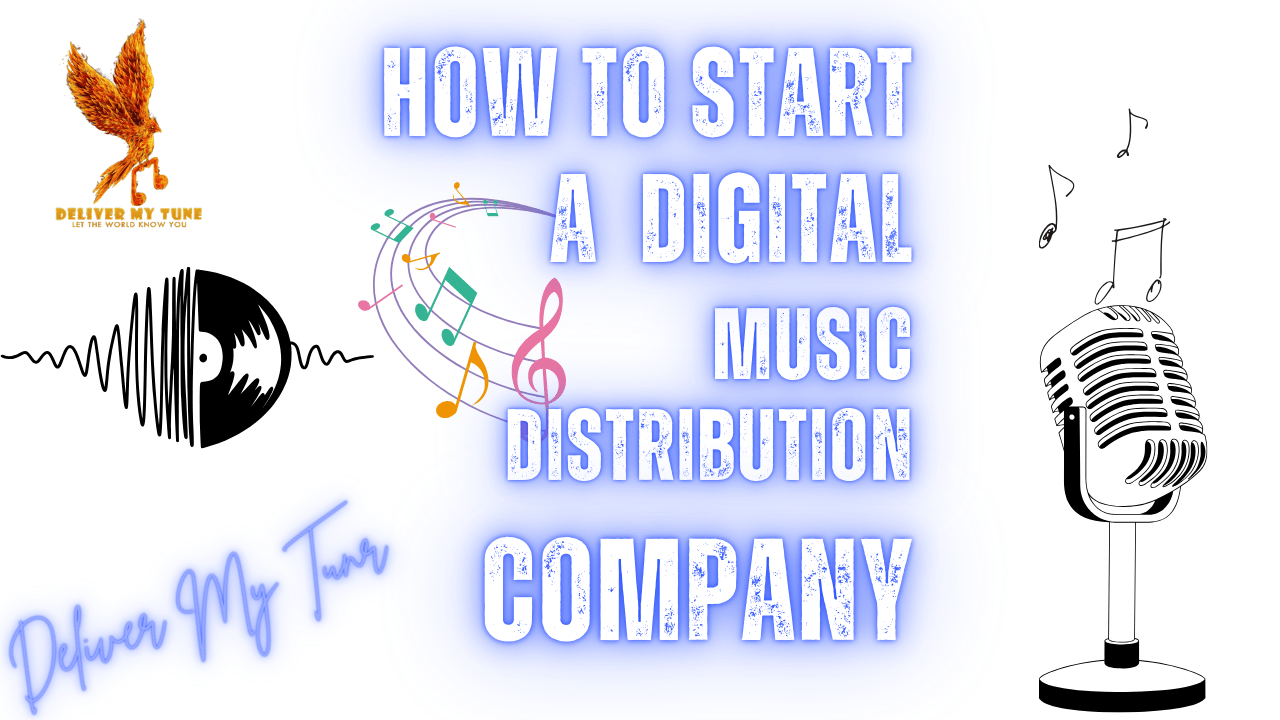Digital music distribution has become the heart of the modern music industry. With streaming services like Spotify, Apple Music, and Amazon Music dominating the music landscape, artists rely heavily on digital distributors to get their music heard worldwide. If you’re considering starting a digital music distribution company, this guide provides a comprehensive look at the steps involved. From initial planning and market research to setting up your distribution technology and attracting artists, here’s everything you need to know.
Understanding the Role of Digital Music Distribution
At its core, digital music distribution is the process of getting music from artists to streaming platforms. Unlike traditional record labels, a digital distribution company does not own the music but acts as an intermediary between the artist and digital music stores. A digital distributor facilitates:
- Distribution to multiple platforms
- Royalty management so artists get paid based on their streams
- Content management for album artwork, metadata, and other track details
- Data analytics to help artists understand their reach and audience
Conducting Market Research and Identifying Your Niche
Market research is essential before starting a digital distribution business. Look at major players like TuneCore, DistroKid, and CD Baby to understand the industry and find gaps where you can provide unique value.
Steps for Market Research:
- Identify Your Target Audience: Will you focus on independent artists, small labels, or a specific music genre?
- Competitor Analysis: Study the services, pricing, and distribution reach of current digital distribution companies.
- Demand Assessment: Identify if there’s demand for specific features such as artist-friendly royalty distribution or global reach to platforms not covered by larger distributors.
This stage will help you carve out a niche in the crowded digital music distribution company market.
Choosing the Right Business Model for Your Distribution Company
The business model you choose will impact your brand and profitability. Some common models include:
- Flat Fee: Artists pay a one-time or annual fee for distribution.
- Revenue Share: The company takes a percentage of the royalties generated.
- Freemium: Basic distribution is free, with premium features like data analytics and artist marketing offered at an additional cost.
Each model has advantages and limitations. For instance, flat fees provide predictable revenue, while a revenue share allows artists to join at a lower upfront cost. Consider your target audience’s needs when choosing your model.
Setting Up Legal Requirements and Licensing
The music industry is governed by copyright and licensing laws, and a digital distribution business must comply with these to operate legally.
Key Legal Requirements:
- Business Registration: Register your business as an LLC or corporation, and ensure compliance with local business regulations.
- Licensing Agreements: Obtain the necessary rights to distribute music, which may involve agreements with rights organizations or licensing bodies.
- Contracts for Artists: Have clear contracts outlining distribution terms, royalty splits, and revenue-sharing arrangements. Consulting a lawyer who specializes in entertainment law is advisable.
Handling these legal aspects will protect your business and build trust with artists and partners.
Establishing the Right Distribution Technology
A digital distribution company relies heavily on technology to manage and distribute content effectively. This includes:
- Content Management System (CMS): For storing music files, metadata, album artwork, and artist information.
- Distribution Backend: A system that automates distribution to streaming platforms and digital stores.
- Metadata Management: Proper metadata is essential for artists’ tracks to display correctly on platforms.
- Royalty Calculation and Payment System: Accurately track streams and automate royalty payments to artists.
Technology is the backbone of your digital music distribution company and ensures efficiency, accuracy, and transparency in operations.
Building Relationships with Streaming Platforms
Building partnerships with platforms like Spotify, Apple Music, Deezer, and Amazon Music is crucial for your distribution company’s success. Establishing these relationships will enable you to expand your reach and serve more artists.
Steps to Partner with Streaming Platforms:
- Apply as a Content Distributor: Many platforms accept third-party distributors. Each has specific application requirements.
- Maintain Quality Standards: Platforms are more likely to approve distributors with a track record of high-quality content and reliable metadata management.
- Offer Value-Added Services: Platforms may be more inclined to work with distributors who provide additional services like metadata correction or artist promotion.
Building trust with these platforms is essential for expanding the reach and effectiveness of your digital music distribution company.
Creating a User-Friendly Website
Your website is the first interaction most artists will have with your business. Ensure it’s professional, intuitive, and easy to navigate. Key sections include:
- Artist Dashboard: Where artists can upload tracks, monitor distribution, view royalties, and access support.
- Transparent Pricing and Services: Display your pricing plans and services clearly, highlighting any unique features like AI mastering or social media support.
- FAQ and Support: Offer FAQs, tutorials, and customer support to address common queries.
A well-designed website builds credibility and encourages artists to trust your digital music distribution company with their music.
Marketing Your Distribution Company Effectively
To attract artists, you’ll need a solid marketing strategy. Here are some effective methods:
- Content Marketing: Share helpful content on topics like digital music distribution, artist promotion, and royalty management.
- Social Media Marketing: Use platforms like Instagram, Twitter, and LinkedIn to connect with artists and promote your services.
- Collaborate with Industry Influencers: Partnering with influencers or musicians can boost credibility.
- Networking at Music Events: Attend music industry events and conferences to meet potential clients and collaborators.
Effective marketing can set your company apart from competitors and help build a strong client base.
Offering Value-Added Services to Stand Out
Many digital distributors go beyond simple distribution to offer artists value-added services. Here are some options:
- Mastering Services: Help artists improve the quality of their music with mastering options, such as AI-powered mastering.
- Music Promotion: Offer playlist pitching or social media marketing services.
- Data Analytics: Provide artists with streaming insights so they can make informed marketing decisions.
These additional services make your digital music distribution company more attractive to artists looking for comprehensive support.
Managing Royalties and Payments
Artists expect accurate and timely royalty payments. A smooth royalty management process is vital for building trust.
Tips for Effective Royalty Management:
- Automated Calculation: Use a system to automatically calculate royalties based on streaming data.
- Detailed Reporting: Provide artists with transparent and easy-to-understand royalty reports.
- Flexible Payment Options: Offer multiple payment methods to make it easier for artists to receive their royalties.
A reliable payment system enhances artist satisfaction and improves retention.
Attracting and Retaining Artists
Artists are the foundation of your digital music distribution company. Here’s how to attract them:
- Incentivize Sign-Ups: Offer introductory discounts or free trials for new users.
- Highlight Success Stories: Share testimonials and case studies from artists who have succeeded using your platform.
- Provide Supportive Onboarding: Ensure new artists have access to clear instructions and support.
The more you focus on artist satisfaction, the more likely they are to continue working with your platform and recommend it to others.
Scaling and Growing Your Business
Once your digital music distribution company is established, focus on growth strategies:
- Expand Platform Partnerships: Increase the platforms you distribute to, including niche and regional services.
- Enhance Customer Support: Invest in a dedicated support team as your client base grows.
- Improve Analytics and Insights: Provide detailed analytics so artists can understand their audience and reach better.
Expanding your distribution network and offering advanced features will help you attract more clients and keep your existing artists engaged.
Staying Current with Industry Trends
The music industry is constantly evolving. Staying up-to-date with trends and technologies can keep your digital music distribution company relevant.
- Keep Abreast of Legal Changes: Music distribution laws and royalty regulations can change frequently. Staying compliant is essential.
- Adopt New Technologies: Consider using AI for metadata management or fraud detection.
- Adapt Your Business Model: Be open to adding new services or changing pricing models based on industry trends.
Monitoring Your Company’s Performance
Continuous monitoring and improvement are crucial to success. Key areas to focus on include:
- Artist Feedback: Regularly collect feedback from artists to understand how you can improve your service.
- Key Performance Metrics: Track metrics like user acquisition, retention rate, and revenue growth.
- Quality Control: Ensure your distribution system is always running efficiently and accurately, with minimal downtime or errors.
Conclusion
Starting a digital music distribution company is a journey that requires planning, dedication, and an understanding of the music industry. With the right approach, you can create a successful platform that empowers artists, connects them with global audiences, and helps shape the future of music distribution. Remember, a customer-centric approach and adaptability to the evolving music landscape will set your business apart.
Related Articles:
For further reading, explore these related articles:
- What is Music Distribution: A Comprehensive Guide for Independent Artists
- Start Your Own Music Distribution Company: A Comprehensive Guide
- Mastering the Art of Spotify Music Distribution
For additional resources on music marketing and distribution, visit Deliver My Tune.






